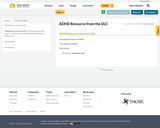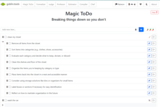
ADHD Resource from the DLC
- Subject:
- Education
- Material Type:
- Primary Source
- Provider:
- Sun West Distance Learning Centre (DLC)
- Date Added:
- 05/16/2019

ADHD Resource from the DLC

A useful website for outlining Learning and Attention Issues. Provides suggestions for implementing adaptations - aimed towards parents but also very useful for classroom applications.
Parents want the best for their children. We do, too. For the first time ever, 15 nonprofit organizations have joined forces to support parents of the one in five children with learning and attention issues throughout their journey.
With the right support, parents can help children unlock their strengths and reach their full potential. With state-of-the-art technology, personalized resources, free daily access to experts, a secure online community, practical tips and more, Understood aims to be that support.

H.O.P.E. (Helping Others thru Peer Education) is Saskatchewan's first Recovery College!
They offer virtual, in person and blending learning opportunities for FREE!
You can:
*take full courses
*listen to Lunch Byte podcast episodes (or register to listen live)
Current course offerings include:
*Adulting 101
*Positivity & Optimism
*Female Empowerment
*Talk-Ask-Listen
*Loneliness & Isolation
*Improving Self-Esteem
*Recovery 101
*Anxiety 101
*Understanding Fear
*Depression 101
*Kids & Stress
*ADHD
*Art Therapy
*Anger Management
*Challenging Procrastination
*Understanding Grief & Loss
*Body Image
& much more!

This site hosts a "collection of small, simple, single-task tools, mostly designed to help people with tasks they find overwhelming or difficult."
This site can help you break down things you need to do at home, school or work into a manageable list of tasks using the "Magic ToDo" tab. The "Estimator" tab will help you know how long your tasks will take.
You can also use the "Formalizer" to improve writing; the "Judge" tab to help determine the tone of something; the "Professor" tab to give you a crash course on anything, the "Compiler" tab to take a brain dump and turn it into tasks and even the "Chef" tab to help you decide what to make for lunch.
This tool is free through the website (the app has a charge).

Hyperactive students tend to have a very high energy level, act impulsively and can be behaviorally distracting. They may fidget, play with objects, tap pencils so loudly against their desk that kids from across the room look over at them, or blurt out answers to teacher questions before the instructor is even finished asking them. When working with students who are hyperactive or impulsive, teachers should keep in mind that these students are very often completely unaware that others view their behavior as distracting or annoying. Teachers working with such children can greatly increase their own effectiveness by clearly communicating behavioral expectations to students, by encouraging and rewarding students who behave appropriately, and by being consistent and fair when responding to problem student behaviors. Here are teacher ideas for managing impulsive or hyperactive students who display problem motor or verbal behaviors: